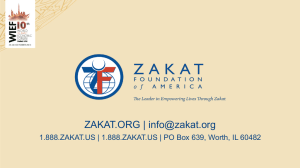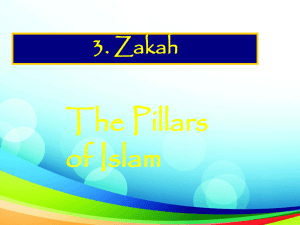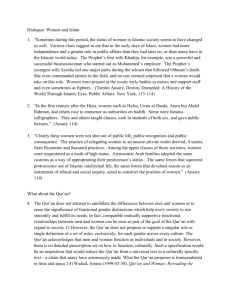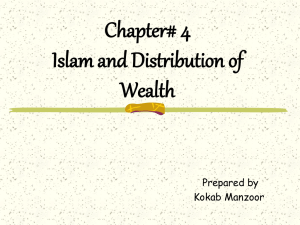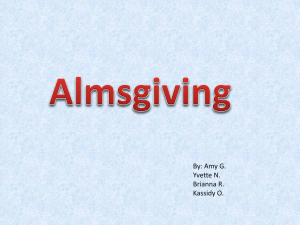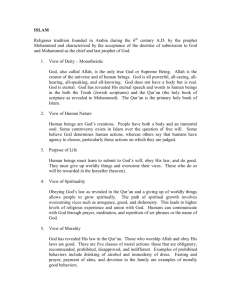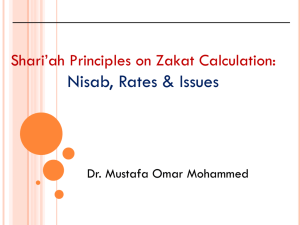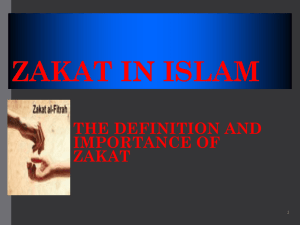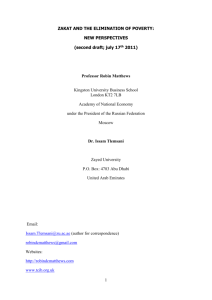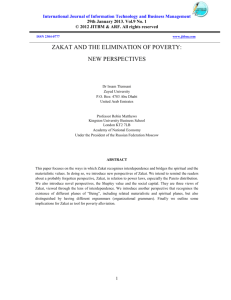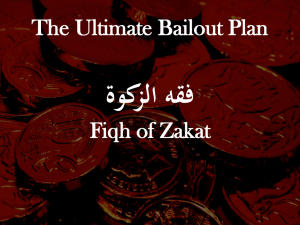Zakat Cleaning your assets
advertisement
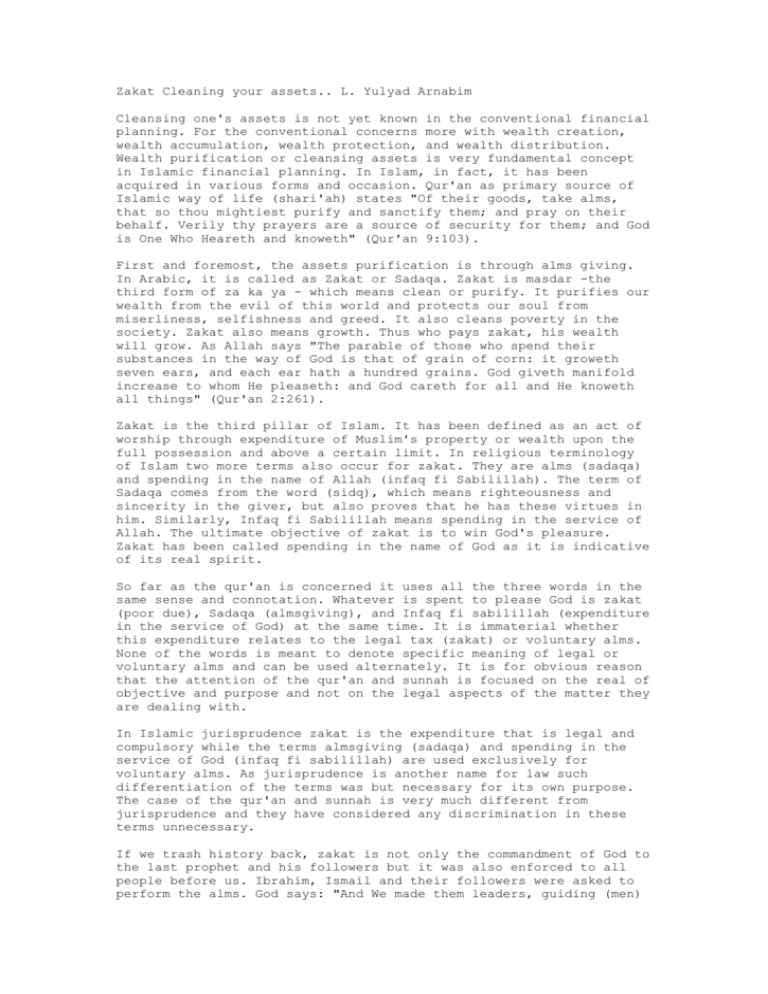
Zakat Cleaning your assets.. L. Yulyad Arnabim Cleansing one's assets is not yet known in the conventional financial planning. For the conventional concerns more with wealth creation, wealth accumulation, wealth protection, and wealth distribution. Wealth purification or cleansing assets is very fundamental concept in Islamic financial planning. In Islam, in fact, it has been acquired in various forms and occasion. Qur'an as primary source of Islamic way of life (shari'ah) states "Of their goods, take alms, that so thou mightiest purify and sanctify them; and pray on their behalf. Verily thy prayers are a source of security for them; and God is One Who Heareth and knoweth" (Qur'an 9:103). First and foremost, the assets purification is through alms giving. In Arabic, it is called as Zakat or Sadaqa. Zakat is masdar -the third form of za ka ya - which means clean or purify. It purifies our wealth from the evil of this world and protects our soul from miserliness, selfishness and greed. It also cleans poverty in the society. Zakat also means growth. Thus who pays zakat, his wealth will grow. As Allah says "The parable of those who spend their substances in the way of God is that of grain of corn: it groweth seven ears, and each ear hath a hundred grains. God giveth manifold increase to whom He pleaseth: and God careth for all and He knoweth all things" (Qur'an 2:261). Zakat is the third pillar of Islam. It has been defined as an act of worship through expenditure of Muslim's property or wealth upon the full possession and above a certain limit. In religious terminology of Islam two more terms also occur for zakat. They are alms (sadaqa) and spending in the name of Allah (infaq fi Sabilillah). The term of Sadaqa comes from the word (sidq), which means righteousness and sincerity in the giver, but also proves that he has these virtues in him. Similarly, Infaq fi Sabilillah means spending in the service of Allah. The ultimate objective of zakat is to win God's pleasure. Zakat has been called spending in the name of God as it is indicative of its real spirit. So far as the qur'an is concerned it uses all the three words in the same sense and connotation. Whatever is spent to please God is zakat (poor due), Sadaqa (almsgiving), and Infaq fi sabilillah (expenditure in the service of God) at the same time. It is immaterial whether this expenditure relates to the legal tax (zakat) or voluntary alms. None of the words is meant to denote specific meaning of legal or voluntary alms and can be used alternately. It is for obvious reason that the attention of the qur'an and sunnah is focused on the real of objective and purpose and not on the legal aspects of the matter they are dealing with. In Islamic jurisprudence zakat is the expenditure that is legal and compulsory while the terms almsgiving (sadaqa) and spending in the service of God (infaq fi sabilillah) are used exclusively for voluntary alms. As jurisprudence is another name for law such differentiation of the terms was but necessary for its own purpose. The case of the qur'an and sunnah is very much different from jurisprudence and they have considered any discrimination in these terms unnecessary. If we trash history back, zakat is not only the commandment of God to the last prophet and his followers but it was also enforced to all people before us. Ibrahim, Ismail and their followers were asked to perform the alms. God says: "And We made them leaders, guiding (men) by our command, and We sent them revelation to do good deeds, to establish regular prayer, and to pay poor due" (Qur'an 21:73). Ismail obeyed the command of his Lord and enjoined prayer and poor due payment on his people: "He used to enjoin on his people prayer and poor due, and he was most acceptable in the sight of his Lord" (Qur'an 19:55). The people of Israel were also commanded to observe the same principle: "And be steadfast in prayer, give regular poor due, and bow down your heads with those who bow down in worship" (Qur'an 2:43). When Prophet Musa went with seventy men to meet his Lord, he was told: "That I shall ordain mercy for those who do right, and give regular poor due, and those who believe in Our Signs" (Qur'an 7:156). Prophet Isa, who was a faithful servant of his Lord, received a similar commandment: "And Allah has enjoined on me prayer and poor due as long as I live" (Qur'an 19:31). From the social aspect, Zakat purifies the wealth and assets of the people. It means and clears it from the shares which do not belong to it any more, the hares which must be distributed among the due beneficiaries. God says "And in their wealth and possessions (was remembered) the right of the (needy), him who asked, and him who (for some reason) was prevented (from asking)" (Qur'an 51:19). When zakat is payable, a certain percentage of wealth should be distributed immediately in the right manner, because the owner no longer has moral or legal possession of that percentage. If one fails to do so, he is obviously retaining something that does not belong to himself. This is corruption and plain usurpation from every point of view, moral, and spiritual, legal and commercial. It means that the unlawfully retained percentage makes the whole lot impure and endangered. But on the other hand, if the poor dividends are distributed among due beneficiaries, the remaining portions of the lot will be pure and decent. Pure capital and decent possessions are the first requisites of permanent prosperity and honest transactions.
